|
Description
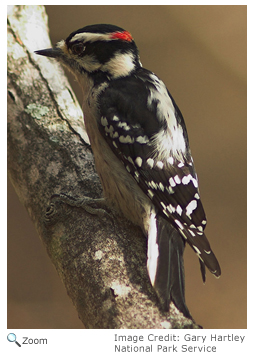 The downy woodpecker is six inches in length and has a small black bill. It has a white chest and back, black wings with white spots, a black tail, a black head with a white "mustache" and white "eyebrows." The male has a red patch on the back of his head. The downy woodpecker is six inches in length and has a small black bill. It has a white chest and back, black wings with white spots, a black tail, a black head with a white "mustache" and white "eyebrows." The male has a red patch on the back of his head.
Range
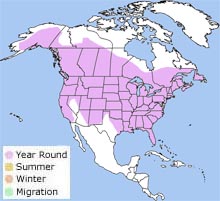 The downy woodpecker is found throughout most of the United States and Canada except for Hawaii, the Southwest, and northern Alaska and Canada. The downy woodpecker is found throughout most of the United States and Canada except for Hawaii, the Southwest, and northern Alaska and Canada.
|
|
Habitat
The downy woodpecker lives in woodlands, parks, and yards.
Diet
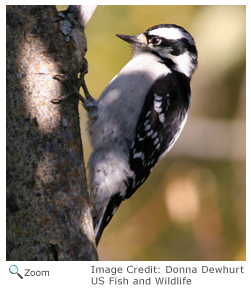 The downy woodpecker uses its bill to drill into trees and dig out insects like beetles, wasps, moths, and insect larvae. It also eats berries and sunflower seeds. The downy woodpecker uses its bill to drill into trees and dig out insects like beetles, wasps, moths, and insect larvae. It also eats berries and sunflower seeds.
Life Cycle
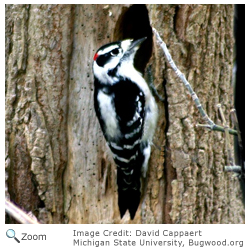 Downy woodpeckers that live in the southern part of their range mate in late winter. They mate in the early spring if they live in the northern part of their range. Both the male and the female make the nest by pecking a hole in a dead tree, fence post, or sometimes, a telephone pole. The nest can take up to two weeks to dig out. The female lays four to five white eggs. The eggs are incubated for about twelve days. Both parents incubate the eggs and care for the chicks. The chicks first leave the nest when they are about three weeks old. Downy woodpeckers that live in the southern part of their range mate in late winter. They mate in the early spring if they live in the northern part of their range. Both the male and the female make the nest by pecking a hole in a dead tree, fence post, or sometimes, a telephone pole. The nest can take up to two weeks to dig out. The female lays four to five white eggs. The eggs are incubated for about twelve days. Both parents incubate the eggs and care for the chicks. The chicks first leave the nest when they are about three weeks old.
Behavior
Downy woodpeckers often mix with other flocks of birds and are often found at bird feeders.
|

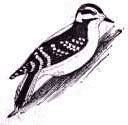

 The downy woodpecker is found throughout most of the United States and Canada except for Hawaii, the Southwest, and northern Alaska and Canada.
The downy woodpecker is found throughout most of the United States and Canada except for Hawaii, the Southwest, and northern Alaska and Canada. 
